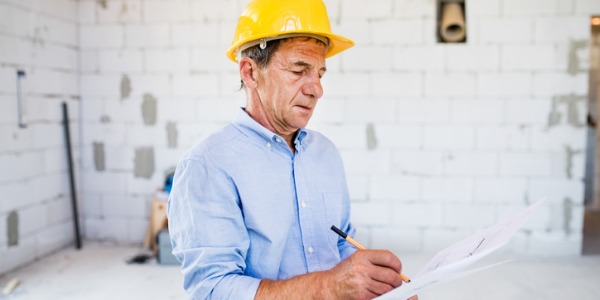What is a Building and Construction Inspector?
A building and construction inspector is employed by a city or township, and inspects buildings for the purpose of making sure they are safe to use. The inspector does this by enforcing the building code, which has detailed and specific standards that need to be adhered to in order to pass inspection.
The building inspected could be a new-build, a remodelling project, or even a prospective real estate purchase that needs an inspection.
What does a Building and Construction Inspector do?
Building code is designed with a certain level of safety and construction quality in mind. Before a structure can be used, the building and construction inspector needs to be called and brought in to thoroughly examine it, approving that it is up to code and safe for use.
Only after the inspection has passed can the building be occupied or sold. Often, building and construction inspectors will take a look at plans for new construction before a structure is even built. The plans are brought to the government offices for approval, thus saving time and money by identifying any issues early on.

When homeowners that are remodelling their home want to make additions or improvements, or tear down part or all of their home, they need to apply for a permit to do so. A building and construction inspector will be involved in this process, making sure it is legally and properly done at different stages of completion.
Building and construction inspectors tend to be meticulous and picky with their inspections. The reason for this is that if an inspector approves a building, and a serious issue develops later on, the inspector could be held liable. It would be helpful for individuals to keep this is mind, as cooperating with the inspector and listening to any of his suggestions or tips can help with quicker inspections and approvals.
Building and construction inspectors can also flag any violations, such as a homeowner putting an unauthorized addition onto the home. The homeowner will be given a certain time period to correct these violations, or can face legal implications.
Building codes change frequently, therefore building and construction inspectors must keep up to date on the latest additions or removals to the code.
A building and construction inspector is typically certified in one or more disciplines, either as a commercial or residential building inspector, or a plumbing, electrical or mechanical inspector. There are several other types of inspectors that are listed below.
Building Inspectors
- check the structural integrity and safety of a building, and determine if the materials used are appropriate and comply with standards
Home Inspectors
- check existing or newly-built residential dwellings (houses, condos and townhomes), for the structural quality and condition of the roof, garage/carport, interior and exterior walls, plumbing, electrical, heating, ventilation, air conditioning and refrigeration systems. They are typically called upon by potential homebuyers who want to see what the condition and structure is of a home before they buy it.
Electrical Inspectors
- will inspect electrical systems to determine if they follow electrical codes and standards. They will check installed electrical wiring for appliances, lighting, wiring, motors, generating equipment, and sound and security systems.
Mechanical Inspectors
- will check the installation of the heating ventilation air conditioning and refrigeration (HVACR) systems and equipment to determine if they work well. They also determine if boilers, commercial kitchen equipment and gas appliances are installed and functioning properly.
Plumbing Inspectors
- will check the installation of water systems, and make sure the water is potable and safe to drink. They will also make sure that waste is being disposed of in a sanitary manner by inspecting the industrial piping.
Plan Examiners
- will check to make sure that the plans for a structure or a building follow building codes and standards. They will also see to it that the building can withstand engineering demands and environmental stresses.
Specification Inspectors
- work for the owners of a structure or a building. They make sure that the building is constructed as per the specifications of the plan. Insurance firms and financial institutions sometimes hire these types of inspectors.
Fire Inspectors
- make sure that the building complies with fire codes and standards, and is not a potential fire hazards that will endanger lives and other infrastructure surrounding it
Public Works Inspectors
- are construction inspectors, and see to it that water and sewer systems, bridges, streets, dams, and highways of local, state, and federal governments are in compliance with contract specifications and do not violate the terms of the agreement already signed. They may specialize in checking ditches, dredging operations, structural steel, highways and reinforced concrete.
Coating Inspectors
- check to make sure that the painting process is followed properly on bridges, pipelines, and holding tanks in order to ensure they are properly coated
Elevator Inspectors
- check to make sure that the mechanical and electrical control systems of escalators, hoists, elevators, lifts, moving sidewalks, amusement rides, and other lifting and conveying systems are installed correctly and working properly
What is the workplace of a Building and Construction Inspector like?
Most building inspectors work full-time, primarily during weekdays. Occasionally, some night or weekend jobs may be required.
Inspectors split their time between completing evaluations of buildings on location and in an office setting, where they draw up their conclusive reports. Protective clothing and gear is often used to keep inspectors safe while in the field.
Building and Construction Inspectors are also known as:
Construction and Building Inspector
Building Inspector
Construction Inspector